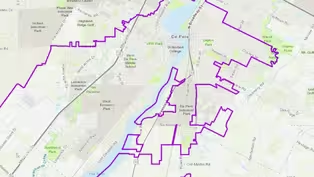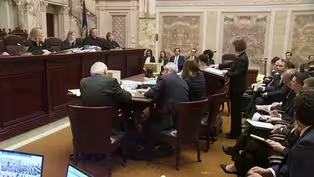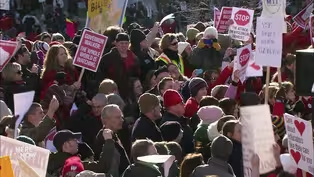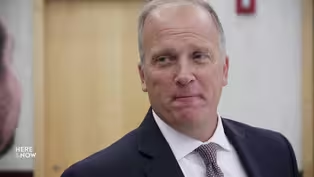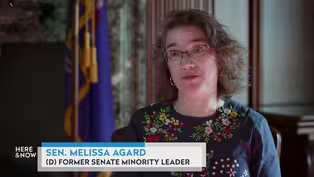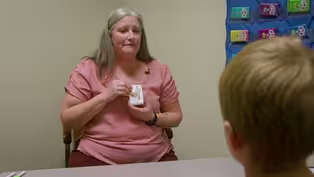Here and Now
Dale Schultz on the Wisconsin Legislative Districts Lawsuit
Clip: Season 2200 Episode 2221 | 7m 11sVideo has Closed Captions
Dale Schultz on state legislative district maps and advocacy against gerrymandering.
Former state Sen. Dale Schultz, a Republican, discusses litigation in the Wisconsin Supreme Court over the legality of state legislative district maps and his advocacy against partisan gerrymandering.
Problems playing video? | Closed Captioning Feedback
Problems playing video? | Closed Captioning Feedback
Here and Now is a local public television program presented by PBS Wisconsin
Here and Now
Dale Schultz on the Wisconsin Legislative Districts Lawsuit
Clip: Season 2200 Episode 2221 | 7m 11sVideo has Closed Captions
Former state Sen. Dale Schultz, a Republican, discusses litigation in the Wisconsin Supreme Court over the legality of state legislative district maps and his advocacy against partisan gerrymandering.
Problems playing video? | Closed Captioning Feedback
How to Watch Here and Now
Here and Now is available to stream on pbs.org and the free PBS App, available on iPhone, Apple TV, Android TV, Android smartphones, Amazon Fire TV, Amazon Fire Tablet, Roku, Samsung Smart TV, and Vizio.
Providing Support for PBS.org
Learn Moreabout PBS online sponsorshipOne former senator and Senate majority leader who voted for the Republican maps that passed in 2011 has been fighting against that gerrymandered nearly ever since.
Former state Senator Dale Schultz joins us now.
Thanks very much for being here.
>> I'm delighted to be here Fred.
>> So if, if you think that the 2011 maps that cemented Republican majorities were so offending in their lopsided partisan favor, why did you vote for them in the first place?
>> Well, it's a great question and I'm glad you asked it.
When I was briefed on what the plan was, all I saw was my own district and historically redistricting had meant maybe a percent or a half percent difference in, in how the votes came out.
So it wasn't that shocking to, to me, when I saw my map, it was shocking to me after the votes came in and I realized that suddenly the what was happening in the legislature did not reflect the overall trend in the state.
And not by a little bit, but by a significant amount.
And as time went by, I learned that we had the most gerrymandered maps in the state.
And I've always thought politicians ought to compete on issues and on principles, not on rigging elections.
And Democrats have done it, Republicans have done it, it doesn't mean it's right.
>> So when you had that realization, what did you do then?
>> Well, I, I found a partner, which wasn't real hard to do because Senator Tim Collin and I had, you know, gone through Act 10 together, sort of as the odd men out trying to figure out what we could do to bring the state back together, bring the, the political parties back to a point where they could discuss things with one another.
So I went with to him and we decided it was an issue that was important.
And then what happened next was kind of a surprise.
Two majority leaders couldn't even get a hearing on a bill that was of longstanding in the neighboring state of Iowa.
And so we decided, you know what, we don't have to operate entirely within the process.
And we took the matter directly to the people in Wisconsin and made, I don't know, a hundred or 150 speaking engagements around the state trying to educate people and build support for the whole idea of taking a look at this a second time.
>> But meanwhile here we are with this latest lawsuit brought by Democrats before the newly liberal majority Supreme Court.
You listened in on the oral arguments in this case.
Do you think the arguments against the current maps hold up like, like the argued need for contiguous districts or separation of powers?
>> Well first of all, I need to admit that I'm not an attorney and I don't even get to play one on Wisconsin public television.
But I listened to the arguments.
I thought the court did a good job.
Regardless of your feelings for either side, I thought the court acquitted itself well, and I do think that the plaintiffs made the case very well.
But I'm less concerned about the court than I'm about the legislature.
You know, both Republicans and Democrats don't have clean hands in this whole regard.
We've now had the governor say he is in favor of an Iowa plan.
We've had Speaker Voss saying the same thing.
All that's really necessary to deal with this is for one of those two gentlemen to pick up the phone and call the other and say, let's have a quiet discussion about what both sides can live with.
Now that doesn't negate what the courts would and should do.
I, I don't think we should have to suffer under these maps any longer.
But more importantly is let's not focus so much on the past or even the present and start thinking about the future.
>> Why should the maps be drawn not by the legislature or the courts in your mind?
>> Well, I, I think that the time has shown in Iowa over 50 years that this system works, that it's fair.
No legislator has ever put in a bill to repeal it and the public is highly satisfied with it in Iowa.
Whereas in Wisconsin we've seen a situation develop in the last few years where no one is in favor of what we've done, not even Republicans.
>> And just to back up a little bit, under the Iowa model, it would be a nonpartisan commission.
>> Correct.
Or a civil servant would work and and develop the maps.
And I don't think more than once has, have they ever had two votes?
And the reason that they haven't had two votes is every legislator looks at their district and they go, well, I'm in my district and it looks pretty good to me, so I'm gonna vote for it 'cause I could get worse.
>> One of the things that I think Justice Rebecca Bradley brought up was this idea that it was undemocratic.
If you have, if you force everybody to go up for reelection under new maps, including state senators who are still in the midst of their terms.
>> Well, but that conveniently ignores the argument that people have been operating under maps that dilute the power of the voters and they've had an unfair advantage.
Why should they be able to continue that even two more years?
>> Why do you think taking the hyper-partisan out of voting maps is good for the electorate?
>> Because I, I don't think when people are engaged in that process now, given the new technology and tools that are available to them, that they're thinking about the voters first.
They're thinking about power because this is really an exercise about power.
My friend Tim Cullen makes that point all the time.
It's not a Republican or a democratic issue.
And it seems every time we engage in this process, the only real loser is the general public.
They ought to be picking their representatives.
It shouldn't happen the other way around.
>> So having lived this now for a decade and been very immersed in it, what do you think is going to be, be the outcome of this state high court ruling?
>> Well, I think that they probably will find it unconstitutional.
I think there seems to be broad consensus on that.
It's not any great insight that I have.
I, I don't have any awareness of what they may or may not do.
I think there's a broad consensus that the public wants a fair set of maps, but that's not the issues before the court.
But I think that the court has sufficient grounds to do something and they could actually be joined by two politicians who said, we're going to take care of the future.
You take care of the immediate present and we would be in a better place in Wisconsin this next spring.
>> We leave it there.
Dale Schultz, thanks very much.
You >> Bet.
Thank you.
Happy holidays to you and all the listeners.
Thank
District Maps Lawsuit Heard by the Wisconsin Supreme Court
Video has Closed Captions
Clip: S2200 Ep2221 | 3m 51s | A legislative district maps lawsuit focuses on "contiguity" and separation of powers. (3m 51s)
Here & Now opening for December 1, 2023
Video has Closed Captions
Clip: S2200 Ep2221 | 1m 9s | The introduction to the December 1, 2023 episode of Here & Now. (1m 9s)
Lawsuit Challenges Act 10 over Public Employee Exemptions
Video has Closed Captions
Clip: S2200 Ep2221 | 36s | A lawsuit argues Act 10 violates equal protection rights for Wisconsin public employees. (36s)
Schimel Enters Race for Wisconsin Supreme Court in 2025
Video has Closed Captions
Clip: S2200 Ep2221 | 1m 22s | Brad Schimel is running against Justice Ann Walsh Bradley on the Wisconsin Supreme Court. (1m 22s)
Sen. Melissa Agard on Wisconsin politics in 2023 and 2024
Video has Closed Captions
Clip: S2200 Ep2221 | 4m 53s | Melissa Agard on 2023 in the Legislature, state Supreme Court and 2024 RNC in Milwaukee. (4m 53s)
Wisconsin Educators Take on the Surge in Early Speech Delays
Video has Closed Captions
Clip: S2200 Ep2221 | 6m 53s | Teachers and researchers struggle to provide support for kids with speech impediments. (6m 53s)
Providing Support for PBS.org
Learn Moreabout PBS online sponsorship
- News and Public Affairs

Top journalists deliver compelling original analysis of the hour's headlines.

- News and Public Affairs

FRONTLINE is investigative journalism that questions, explains and changes our world.












Support for PBS provided by:
Here and Now is a local public television program presented by PBS Wisconsin
